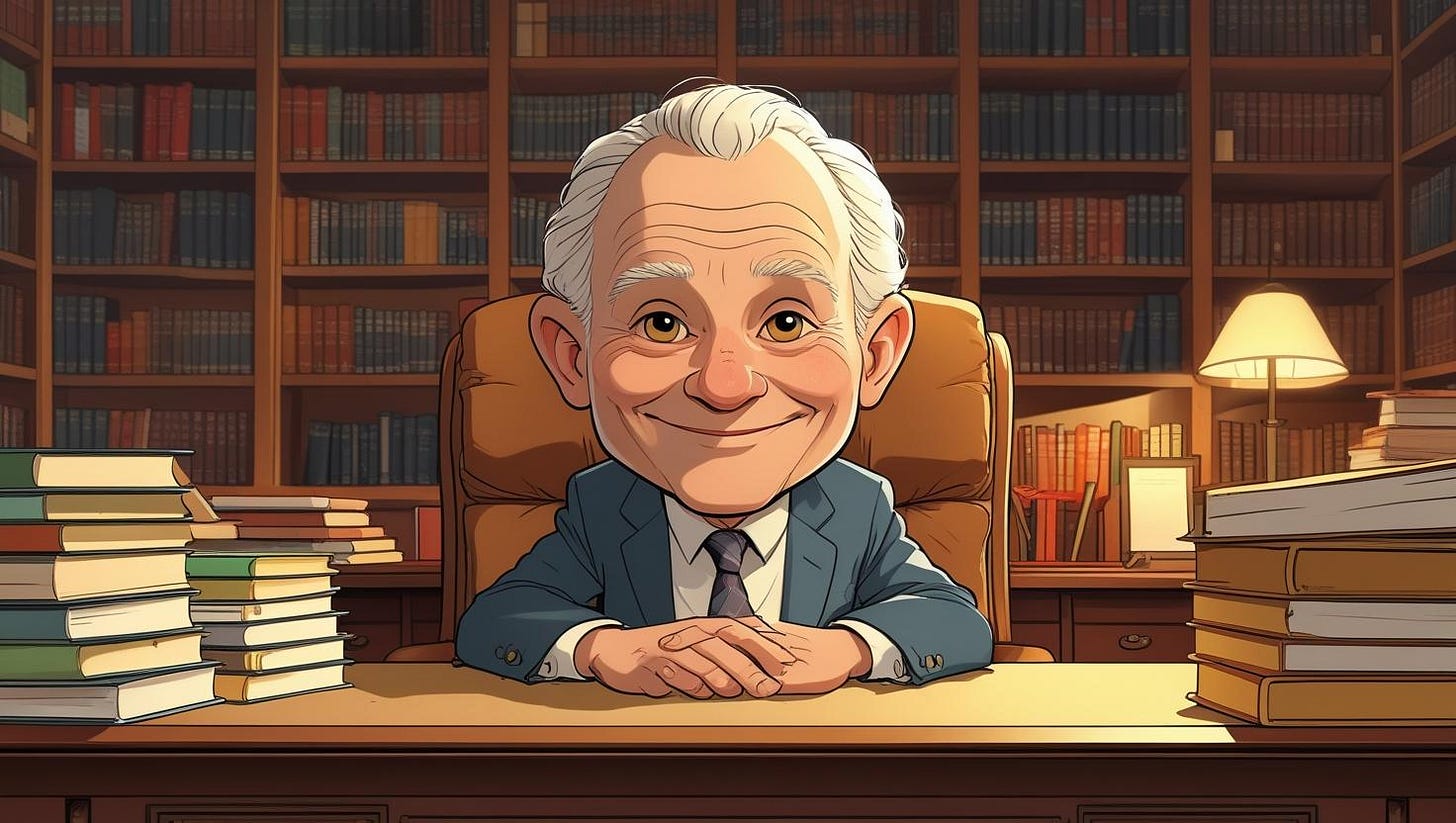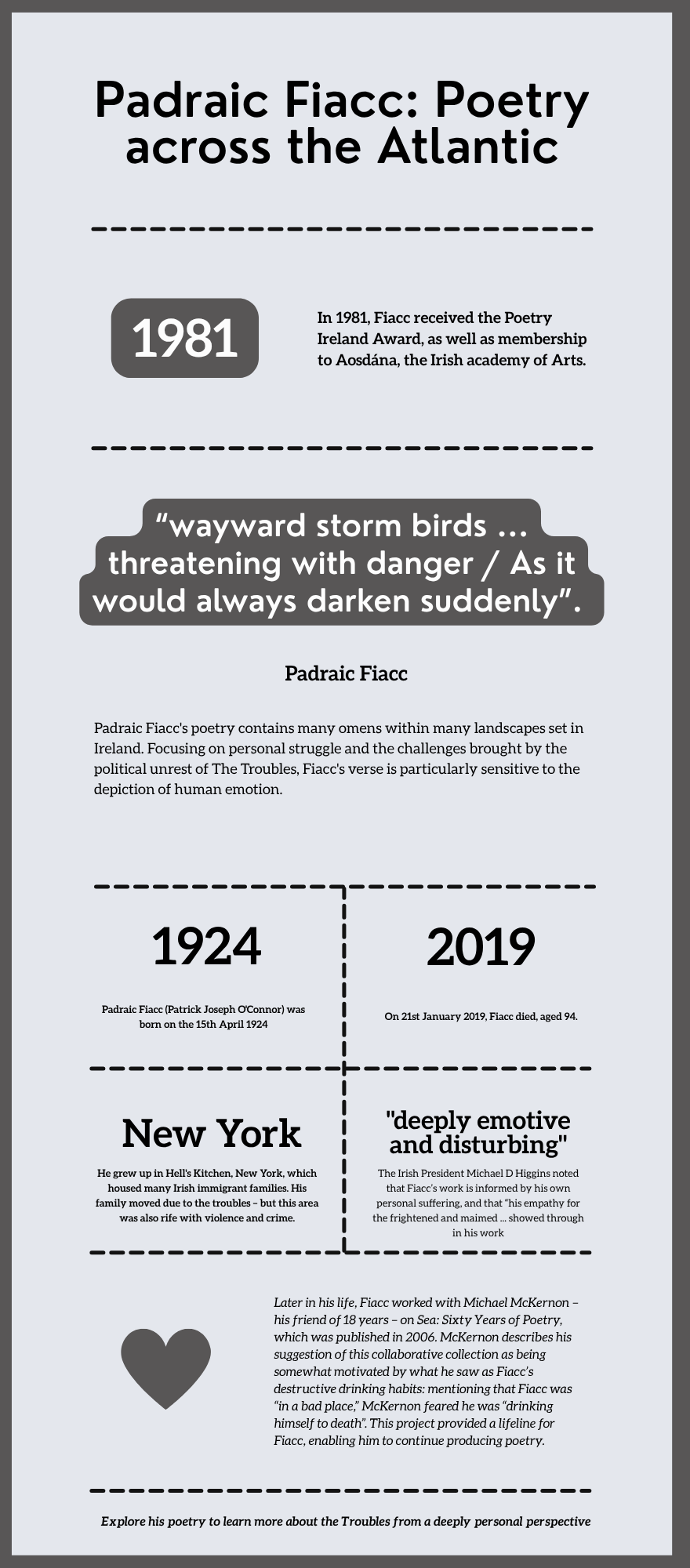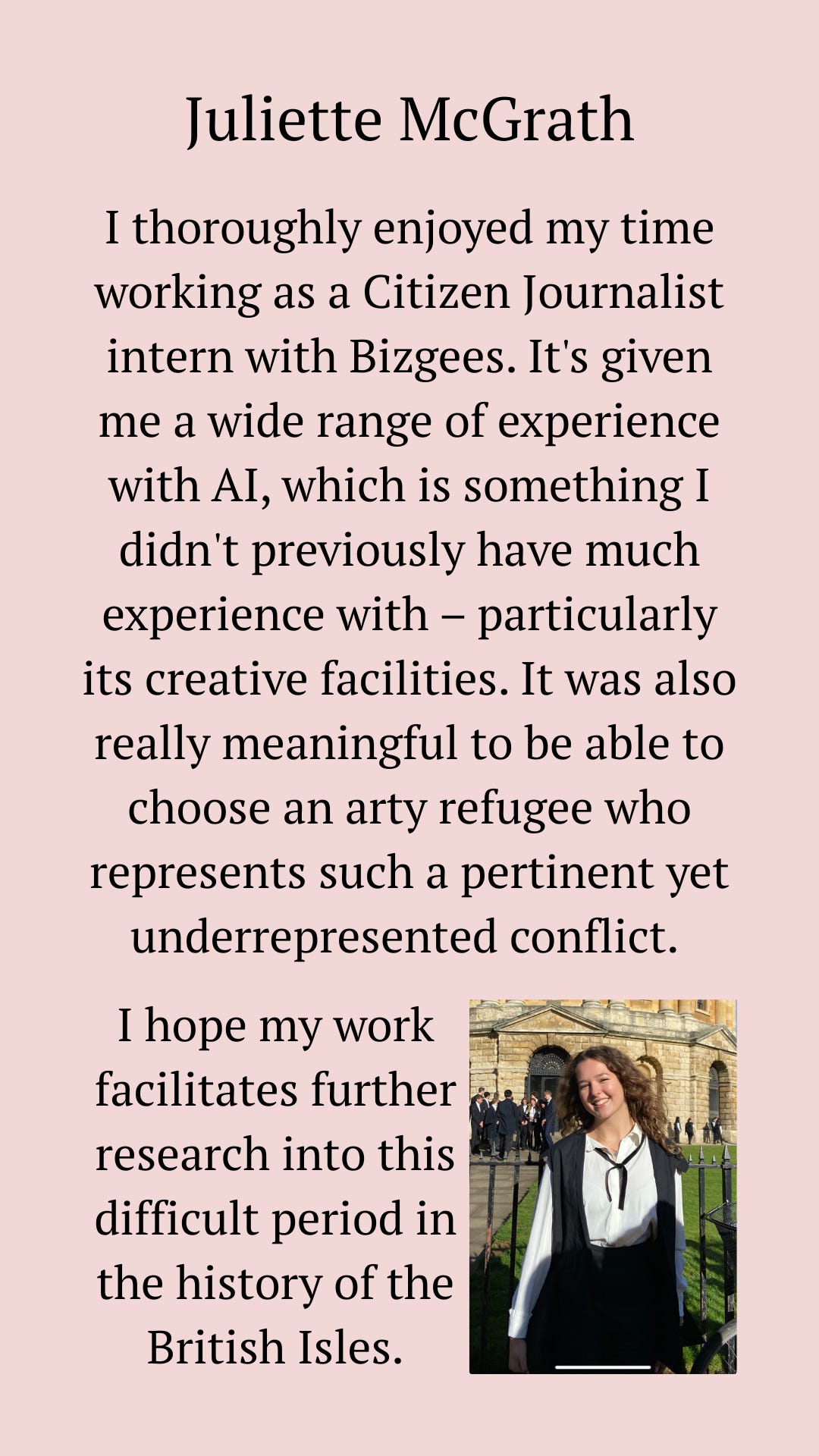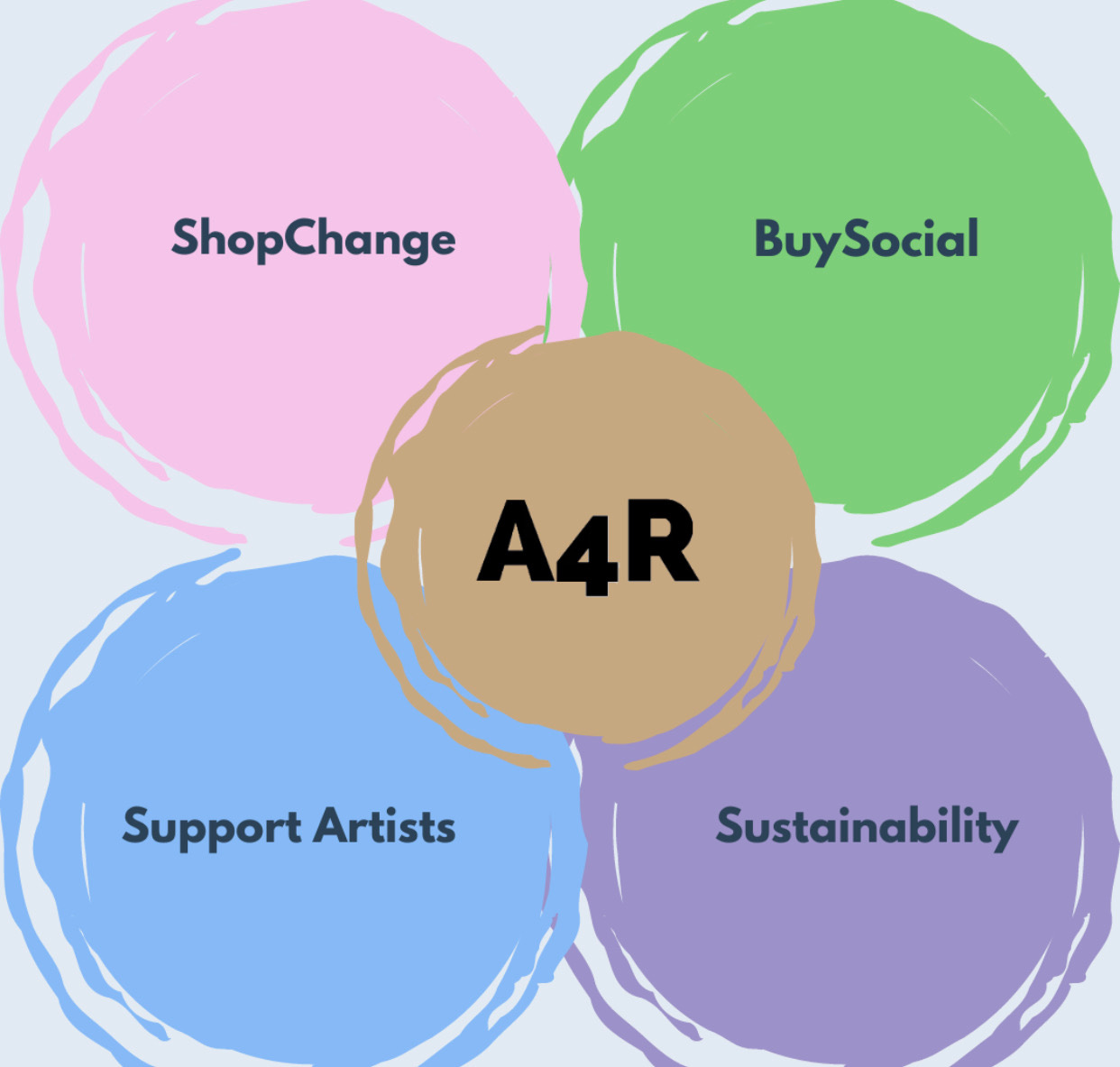From Belfast Riots to Hell's Kitchen NYC: Discover the Raw Poetry of Padraic Fiacc ✍️🇮🇪
Play & learn about Padraic Fiacc's arty refugee experience 🎮
Click here to play & learn.
Back Story
Summary
Padraic Fiacc was born in Belfast on 15th April 1924, and despite having lived in the US for much of his life, also died in Belfast aged 94, on 21st January 2019. He is renowned for his prolific contribution to English Literature – while he is best known for his poetry, he also wrote for theatre too as a student. Having lived in Belfast for short stints during the Troubles, and in America during the 2nd World War, Padraic’s life was wrought with political instability and violence. These themes are often central to his poetry – especially his renowned collection The Wearing of the Black (1974). His main achievements include winning the AE Memorial Award in 1957, and since 1981, his membership of Aosdána, the Irish academy of artists.
Early Years
Padraic Fiacc (born Patrick Joseph O’Connor – his pseudonym translates to Patrick the Raven) grew up in lower Falls area of South Belfast with his grandparents, who moved to the area after their entire house in Lisburn was burned by anti-Catholic rioters. His father had left to work in the US as a barman when he was young – the rest of Padraic’s family later emigrated to New York in the late 1920s. He grew up in Hell’s Kitchen, which had a notable impact on his poetry, contributing significantly to the appearance of poverty and violence in his earlier work. While at school, Padraic produced several plays, and wrote Innisfail Lost – his first collection of poetry. These were reviewed by Padraic Colum, who ended up becoming a mentor figure for Fiacc throughout his career. Colum advised Fiacc to write about his Irish heritage, instead of his move to America. Looking back at Fiacc’s work, it is easy to tell that he followed this insightful piece of advice; with poetic landscapes often depicting rural Irish scenes, or desolate urban moments, Fiacc’s poetry is thoroughly steeped in Irish images.
Fiacc also enrolled in the seminary, first attending St Joseph’s Seraphic Seminary in New York, and then studied with the Irish Capuchin Order in Delaware for five years, between 1941 and 1944.
Returning to Belfast
After Fiacc’s education in the seminary, he decided to move back to Belfast for the first time in 1946, to avoid military service in the US, but left Belfast again to return to New York in 1950. During this four-year period in Belfast, he published poetry, which was printed in journals and magazines, including the 1948 volume of New Irish Poets, as well as The Irish Times, the Irish Bookman, Poetry Ireland and Rann.
His mother died in New York in 1952, and this led to Fiacc’s decision to move back to New York, to enable him to care for his younger sister Mary, as well as his alcoholic father. However Fiacc did not spend long in America, moving back to Northern Ireland (Glengormley) in 1956. It was in this house that he cultivated friendships with numerous Irish writers, including established poets such as Seamus Heaney, but also emerging talent, including Gerard McLaughlin and Michael McKernon.
Career
Recognitions of Padraic Fiacc’s work include his membership of Aosdána, the Irish academy of artists, in 1981, which coincided with his receipt of the Poetry Ireland Award. He was also awarded the AE Memorial Award in 1957. It was in this year that his first collection of poetry was published – Woe to the Boy, which was followed by By the Black Stream (1969). After this, Fiacc suffered from mental health issues due to an incredibly difficult personal life – his marriage broke down, and his close friend, fellow poet, and somewhat protege Gerard (Gerry) McLaughlin was murdered in 1975. This directly impacted his later collections of poetry: Odour of Blood (1973), The Wearing of the Black (1974), Nights in the Bad Place (1977), The Selected Padraic Fiacc (1979), and Missa Terribilis (1986) are all united by their focus on individual loss alongside wayward political activity.
Later, he worked with Michael McKernon – his friend of 18 years – on Sea: Sixty Years of Poetry, which was published in 2006. McKernon describes his suggestion of this collaborative collection as being somewhat motivated by what he saw as Fiacc’s destructive drinking habits: mentioning that Fiacc was “in a bad place,” McKernon feared he was “drinking himself to death”. This project provided a lifeline for Fiacc, enabling him to continue producing poetry
Poetic Style
Fiacc’s poetic process has been noted as fragmentary, because of the way he pieced together parts of poems throughout his career, and would publish combinations of these fragments much later than they had originally been written.
Gerald Dawe also notes Fiacc’s utilization of omens and presentiments within his poetry; seemingly superstitious, Fiacc’s poems often contain simple omens within the grey Belfast landscape. For example, one of his most loved poems, ‘First Moment’, notes the “wayward storm birds”, “threatening with danger / As it would always darken suddenly”. Retaining a sense of tension within scenes of calm, this is one technique that makes Fiacc’s verse resemble the consistently unsettled sensation felt by the inhabitants of Northern Ireland in this extended period of political unrest.
Michael McKernon, the multimedia artist who worked with Fiacc on the publication of Sea: Sixty Years of Poetry (2006), described Fiacc’s work as “a vivid documentary of his extraordinary life lived between Belfast and New York”, and claimed that “I believe he is a legendary modern poet of the 20th century, whose stature will continue to grow." Certainly, with greater interaction with the stories behind the works of refugee artists, the eminence of artists like Padraic Fiacc can only continue to grow.
Politics
Fiacc has been described as a “chronicler of brutal sectarian conflict”, and even with a quick skim of his work, it is not difficult to see why. His poetry often reflects his personal experiences with the turbulent political climate of Northern Ireland. He was not afraid to publish work that invited controversy upon him – however, while contemporary readers found fault with his work, he has since been praised for his clear, emotive depiction of the horrors that were often silenced by citizens. His work offers a highly personal insight into a period that many struggled through, experiencing huge loss, trauma, and political neglect. Since his death, Irish President Michael D. Higgins noted that “Having experienced tragedy and loss, Padraic Fiacc was never afraid to reflect dark, deeply emotive and disturbing elements in his verse. His empathy for the frightened and maimed individuals on either side of the divide shone through his work”.
Academics studying Fiacc’s life are also fascinated by the role that politics played in his work: Gerald Dawe, Belfast poet and emeritus professor of English at Trinity College Dublin, who co-edited Padraic Fiacc: Ruined Pages (1994) with Aodan Mac Poilin, offers an interesting angle on the simultaneously provoking yet insightful nature of Fiacc’s poetry: stating "The books he published tell this story in a shocking way, offending many with their often barbarous and fragmented utterance but lit throughout with black irony and gallows humour". He described Fiacc's style as "Beckettian in its bleak physicality and intensity, tragic-comic, anti-heroic, counter-lyrical – even anti-poetic – and unlike anything else produced by an Irish poet during the last half-century." It is this element of brutal emotion in Fiacc’s work, and his development of a new poetic style to support this experience, which sets his poetry apart, and ultimately led to international recognition of his genuinely unique artwork.
In this post Juliette highlights the arty refugee experience of Padraic Fiacc. She is a citizen journalist on a placement with us organised by Oxford University Career Services. She also organised the micro game to make the journalistic experience interactive.
Thank you for reading an A4R 🎨 Post. Don’t forget to visit our gift shop here. Every purchase scales our impact and pays our bills.





